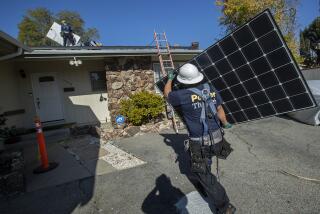No tax return, no rebate check
- Share via
About 20 million Social Security recipients and other Americans who aren’t required to file tax returns will need to do just that if they want to get rebate checks under the economic stimulus package signed into law Wednesday.
The Internal Revenue Service said it would conduct a sweeping program to publicize the requirement to file a return, but some experts said many people eligible for rebates would fall through the cracks.
“It’s a pretty difficult thing to convince somebody who normally doesn’t have to file that they need to file to get a rebate check,” said Mark Luscombe, a tax analyst at publisher CCH Inc. “I would predict it’s going to be a disaster.”
Even among those who do get the word, he said, many “will not figure out how to get their returns filed, will not file and, therefore, will not get their rebate checks.”
Government officials acknowledged the challenge.
“We are doing an aggressive outreach and education campaign with Veterans Affairs, Social Security and AARP,” acting IRS Commissioner Linda E. Stiff said Wednesday. “We are trying to leave no stone unturned to make sure that people understand that they qualify.”
Most taxpayers don’t need to do anything special to get their rebates, Stiff said, “but there are some exceptions.”
Those exceptions are:
* Seniors whose primary income comes from untaxed sources such as Social Security
* Low-income workers who earn too little to pay tax
* Veterans receiving disability and pension income, and spouses of deceased veterans who get survivors’ benefits
* Retired railroad workers
The seniors, veterans and railroad workers weren’t included in the original version of the stimulus bill endorsed by the White House and passed by the House, but they were added when the Senate acted on the measure.
The IRS plans to start sending out checks in May to those who have filed their 2007 tax returns by the April 15 deadline, but the process is likely to take several months. If you file for an extension, you won’t get your rebate until after you submit your return.
President Bush signed the stimulus bill Wednesday in the East Room of the White House, joined by Democratic as well as Republican congressional leaders. The gathering reflected the bipartisan enthusiasm for the measure, which is intended to prevent or minimize a recession in the wake of the housing downturn and credit crunch.
The bill will usher in a host of temporary tax breaks, including some for businesses, as well as the rebates.
The precise amount of your rebate depends on how much income tax you paid in 2007. In general, single people will get $600 each or a full refund of the 2007 tax paid, whichever is less. For married people, it’s either $1,200 per couple or the full refund of 2007 taxes.
If you earned at least $3,000 last year but paid less than $300 in tax for a single person or $600 for a married couple, you will get a rebate of $300 per person or $600 per couple.
In addition, parents will get as much as $300 for each child.
The rebates are phased out for higher-paid people, starting at an adjusted gross income of $75,000 for a single person or $150,000 for a couple. There are no rebates for people with no children who make more than $87,000 each or $174,000 per couple.
Those who would not normally have to file a tax return need to fill out only a couple of lines on their tax return to get their rebate, Stiff said.
Those receiving Social Security, railroad retirement or veterans’ benefits need to file Form 1040 or 1040A to note only their names, addresses, Social Security numbers and the amount of qualifying income -- their Social Security or veterans’ benefits. That amount would go on line 20a of Form 1040 or line 14a of the 1040A.
Low-income filers may be able to use Form 1040EZ to simply note that they earned income of at least $3,000.
Although the requirement to file a return to get a rebate is likely to cause confusion for millions, some tax experts called it a necessary evil.
“If you are going to give everybody a check and call it a tax rebate, I don’t know how you do that without a tax return,” said Clint Stretch, managing principal of tax policy at accounting firm Deloitte & Touche in Washington.
Government officials said they didn’t know how many people would be newly required to file.
AARP, formerly the American Assn. of Retired Persons, previously estimated that 20 million seniors wouldn’t qualify for rebate checks under the first version of the stimulus bill because they earned too little to pay tax.
Taxpayer groups estimate that there are several million low-income workers who aren’t normally required to file and will need to do so to get a rebate. Some of those workers, however, would be filing for other reasons, such as to claim the earned income tax credit.
In addition, an estimated 250,000 veterans will be affected by the filing requirement in the stimulus bill.
--
--
(BEGIN TEXT OF INFOBOX)
Rebate help
Lower-income and older Americans who need assistance filing their tax returns can get help from one of the following programs, the Internal Revenue Service said Wednesday.
Volunteer Income Tax Assistance, or VITA, helps low-income and moderate-income taxpayers. To find a location near you, call (800) 906-9887.
AARP Tax-Aide program helps filers who are 60 or older. The program can be reached at (888) 227-7669.
Source: Internal Revenue Service;
Times research
More to Read
Sign up for Essential California
The most important California stories and recommendations in your inbox every morning.
You may occasionally receive promotional content from the Los Angeles Times.













